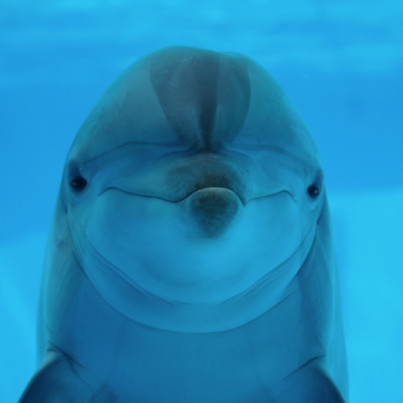Click here to watch the TEDTalk that inspired this post.
I am sitting on a marathon flight back home to New York City from a conference I attended in New Zealand on the Biology of Marine Mammals - the preeminent meeting of international scientists who have devoted their work to the study of the biology, behavior, cognition and communication of dolphins, whales and other aquatic mammals. For the past 30 years I've been attending this meeting to present and share my new research findings about dolphin intelligence and communication with my colleagues. I feel very fortunate to have seen a few glimpses of the inner cognitive life of dolphins. For example, in 2001 we discovered that dolphins, like us, have the mental capacity to understand that it's their face in the mirror, and, like us, they are interested in using the mirror as a tool to view themselves. They twist as we do to view themselves at different angles, they look closely into their own eyes, and look at the inside of their mouths. They watch themselves display creative behavior at the mirror. Like us, they have a sense of self.

Over the past forty years sound peer-reviewed research has shown dolphins to be both highly intelligent and highly social mammals. Given this, it is hard to comprehend how the notorious drive hunts in Japan, as documented in the Oscar-winning film "The Cove," persist day after day, year after year. Other brutal hunts of pilot whales also continue in the Faroe Islands. The dolphins and small whales in these hunts continue to be herded and killed in a manner that is as brutal and inhumane as can be imagined. These commercial hunts cause unspeakable pain and suffering for these highly evolved species. Incomprehensibly they are conducted by modern technologically advanced societies. How can these practices continue in light of what we know?
Scientific knowledge should inform ethical attitudes. Facts can and should alter our behavior. And yet, given the incontrovertible fact of cetacean intelligence and consciousness, these drive hunts persist, day after day, year after year. -- Diana Reiss
Our scientific knowledge cannot only move across geographical boundaries, it must transcend cultural boundaries as well. Scientific knowledge should inform ethical attitudes. Facts can and should alter our behavior. And yet, given the incontrovertible fact of cetacean intelligence and consciousness, these drive hunts persist, day after day, year after year. And thousands--yes, thousands--of dolphins and whales continue to suffer the slings and arrows, literally, of outrageous human misbehavior.
So this year, I attended the conference in New Zealand not to present another scientific paper about dolphin intelligence. Instead I chose to participate in an invited panel and spoke to my peers about our responsibility as scientists to use our science and speak out for the animals that we study. Now that we know what we know about them, our scientific knowledge needs to play an active role in influencing local, national and international policy forums. We need to fight for global protection for these species who have no audible voice in these forums. Ivory tower science is a luxury of the past. Dolphins and whales need a collective voice from international scientists to communicate what the evidence strongly supports. And governments should be glad to listen. The brutal commercial killing of dolphins and whales in the drive hunts is unjustifiable on all counts. How is it that this practice continues to be acceptable in any society?
We humans we can do better than this.
Ideas are not set in stone. When exposed to thoughtful people, they morph and adapt into their most potent form. TEDWeekends will highlight some of today's most intriguing ideas and allow them to develop in real time through your voice! Tweet #TEDWeekends to share your perspective or email tedweekends@huffingtonpost.com to learn about future weekend's ideas to contribute as a writer.